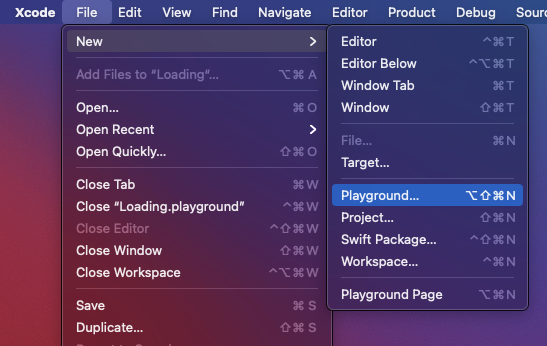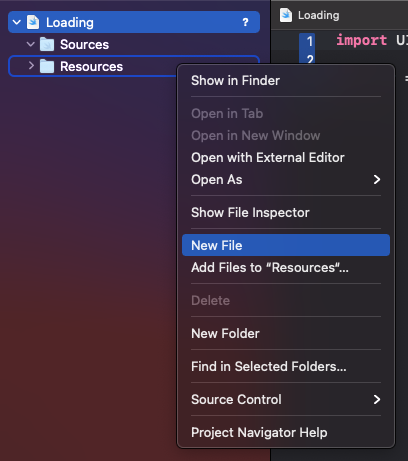Loading files in Xcode Playgrounds
Xcode Playgrounds are a great way to experiment and try out code in a sandbox. It even allows us to bootstrap screens and quickly challenge a design idea. Although they are sometimes a bit buggy they probably are an underutilized tool.
In this quick example I want to show you how you can load files from disk in an Xcode Playground. The use-cases for this are wide-ranging. You might try to experiment with loading a JSON-file to see how you can convert a server-response into your pre-defined data format.
Another application might be some textual data that you want to preprocess and convert into a different format. You can run Swift code step by step to cover the entire process of conversion or even experiment with new Xcode features in a sandboxed environment.
There are two examples I want to give: loading a .txt-file and loading a .json-file. We can even combine the two and work with an enum.
Create new playground
In order to have something to play with we first create a new playground. We can do this in Xcode using File- New- Playground. I'll give mine the wonderful name Loading.

Create a file to work with
First, you need to import a file into the Resources directory of your Playground. You can do that by right-clicking on the Resources folder as shown below. Then you can call it sample.txt or sample.json depending on the type of file you want to load.

(If you have the challenge to find files to try out, here you can find a sample text file and here is a sample for a json file. Just copy the content into the file and you're good to go.)
Load the file(s)
Now, on to the challenge of loading the file. They are located in the Bundle.main part of our little sandbox that is our Playground. We can then grab the URL of the file with the Bundle.main.url function. Then, we can use the initializer with the options String(contentsOf:encoding) to convert it to a String.
In order to make it reusable we can call that inside a function. We'll start off with a .txt file and then generalize it. See below our wonderful file loading code:
func load(file named: String) -> String? {
guard let fileUrl = Bundle.main.url(forResource: named, withExtension: "txt") else {
return nil
}
guard let content = try? String(contentsOf: fileUrl, encoding: .utf8) else {
return nil
}
return content
}
We can then call the function and print the output using the following code snippet:
print(load(file: "sample")!)
(Notice that I'm force unwrapping the return value of our load function with the ! operator. Since I know that I just put the file there, I know that is available. In circumstances where we work with data that is not entirely under our control we should be more cautious here and check for errors.)
Generalize our function for any file type
This works fine for the text file. We could also create another function that works similarly for json-files by exchanging the withExtension parameter to json. While that technically works I think we can do better than that.
First we'll create an enum called FileExtension. We want to use raw values for the cases of the enum so we need to declare the type to be String. Then, we can declare cases for our file types. In fact we can declare as many types as we want, so we could simply extend this for xml, html or other fantastic file types that we all love and enjoy.
Enough with the raving about file types and on to the code:
enum FileExtension: String {
case txt = "txt"
case json = "json"
}
This little enum now allows us to extend our load function to receive another parameter called ofType that is of type FileExtension. We can use the rawValue of this parameter to hand to the withExtension parameter of the url call. This gives us the following function:
func load(file named: String, ofType fileType: FileExtension) -> String? {
guard let fileUrl = Bundle.main.url(forResource: named, withExtension: fileType.rawValue) else {
return nil
}
guard let content = try? String(contentsOf: fileUrl, encoding: .utf8) else {
return nil
}
return content
}
Now we can call the function for either .txt-files or .json-files by providing the respective extension. Here are examples of both calls:
print(load(file: "sample", ofType: .txt)!)
print(load(file: "sample", ofType: .json)!)
Summary
Xcode Playgrounds offer a great way to experiment with a lot of different features. Having the ability to load content from files gives us a great way to iterate on code in a safe environment or even just experiment.
With the straightforward code in this little tutorial we can make this happen in a quick and reusable way.
If you use Xcode Playgrounds yourself I'd love to hear from you which things you cover with them. Feel free to tweet at me or hit me up with a DM there. I hope you find this article useful.
